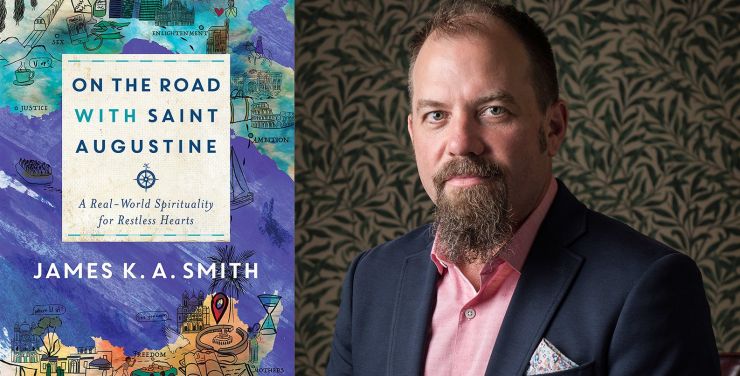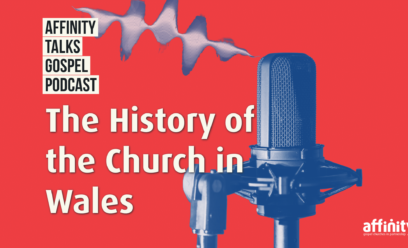Review: On the Road with Saint Augustine: A Real-World Spirituality for Restless Hearts

The latest edition of our Foundations theological journal was published at the end of November. It contains articles and book reviews of help and encouragement to those wanting to engage with scripture and theology at a deeper level, yet still being practical and applied.
One such book review is of ‘On the Road with Saint Augustine: A Real-World Spirituality for Restless Hearts’, James K. A. Smith (Brazos Press, 2019), 240pp, £16.99
Smith should need no introduction, though if you have not come across him, then this book is a good place to start. On the Road is a fascinating blend of biography, theology and spritiuality, and Smith writes beautifully. Rather than repeating biography, of which there is much on Augustine – with Rowan Williams having most recently written an accessible but thorough introduction – Smith focuses on him as “the patron saint of restless heart”. Tracing through both Augustine’s life and work the theme of understanding the self, this is both a guide to reading Augustine and a framework for understanding ourselves
Smith notes throughout that there is much in Augustine that makes him amusingly contemporary to readers like me, Westerners in the twenty-first century, in a way that is a surprise without the common language of the gospel. What ties us together, of course, is the eschatological reality that we find ourselves in the same time, the time between the times. Smith writes that “The graced soul gifted with freedom is still on the way, still sighing after an ultimate release from the parts of myself I hate and hide. This longing, for Augustine, is eschatological, a kingdom-come hunger”, echoing the great Pauline paradox of Romans 6-8.
One particular highlight, very relevant to our contemporary culture, is Smith’s chapter on ambition, which he names as “a many-splendored, much-maligned thing”. Smith shows us that for Augustine, one way of understanding it is as idolatry, which existentially speaking is “an exercise in futility… which is why it creates restless hearts. In idolatry we are enjoying what we are supposed to be using. We are treating as ultimate what is only penultimate… we are settling on some aspect of the creation rather than being referred by it to its creator”. Smith, although it could be Augustine, asks the question “what is our aim in life? What are we aiming for when we aim our lives at some aspiration?” In this, Smith demonstrates the benefits of a conversation around ambition for meaningful evangelism and discipleship in our culture. Ultimately, the solution is in recognising the truth of being in Christ, “When you’ve been found, you’re free to fail”.
The obligatory chapter on sex is less about rehabilitating Augustine’s influence, and more about naked honesty. This is a chapter that faces the complex reality of human sexuality, and does so beautifully, answering the deeper question behind all conversation around sex: “What do we want when we want to have sex?” As Smith writes, “The problem isn’t sex, it’s what I expect from sex”. Expecting the goodness of the creator from the inadequacy of created things is a reality with great resonance! Smith goes on, noting that “an ancient celibate bishop might have insight that speaks directly to our #MeToo moment, as the systemic monstrosities of male sexual desire are uncovered and named for what they are”. Smith closes this chapter in a way that offers a helpful corrective to both churchly concerns and cultural obsession: “Every saint has been born of lovemaking. It’s when we stop idolizing sex that we can finally sanctify it.” Amen!
Another thread woven throughout the whole book is that of the importance and reality of relationships. Whether it is the short but sweet chapter on Augustine and his mother Monica, or the similarly short chapter on fathers, Smith’s reflections on friendship and other ways of relating are sweet and rich. In the chapter on friendship Smith continues to draw in key voices from philosophical and theological conversations that are inspired by or antagonistic to Augustine, yet in a way that makes the book work well. Alongside interactions with thinkers such as Heidegger and Charles Taylor, however, Smith is also relentlessly realistic and practical: “The Augustinian embrace of community and friendship is not utopian or idealistic. It is unstintingly clear-eyed about the realities of being-with, identifying the sorts of grievances and annoyances that still infect even our best friendships.”
Throughout On The Road, Smith deploys pop culture references and good humour to keep things engaging, to relate this ancient monk to our strange new world. One major piece of overlap is the question of truth – something our society clearly struggles with (for more, see Mark Meynell’s A Wilderness of Mirrors, or Kristi Mair’s MORE: Truth). Smith channels Augustine in a way that is timeless, if bitingly close to being aimed at Oprah and similar voices: “If the actual truth disrupts my enjoyment, I resent the truth all the more. What I love in this case is my truth, not the truth.” In this, Smith rightly notes the complexity of coming to believe things, and that our claims to objectivity are as false as anyone else’s – we are not just brains in jars, but complex beings. For example, “it was Ambrose’s hospitality that prompted Augustine to reconsider the faith he’d rejected as unenlightened”. This resonates with the picture of Jesus we have in the Gospels: alongside clear teaching and masterful engagement with the ideas of his day, “The Son of Man came eating and drinking, and they say, ‘Look at him! A glutton and a drunkard, a friend of tax collectors and sinners!’ Yet wisdom is justified by her deeds” (Matt. 11:19).
One unexpected takeaway from On the Road was the humility of Augustine, or at least the intellectual and spiritual humility he aspired to and can teach us. In this humility, perhaps most famously seen in the “warts-and-all” reputation of his Confessions, is ultimately Augustine’s search for identity, within which we share. Smith observes that “Our longing for an identity is bound up with finding a story”, and “The book that would finally arrest this search for a story was the Bible”. A key aspect of this story is justice, and Smith’s treatment of this topic in/and Augustine is very helpful. Interestingly, Smith notes that “There isn’t really an ‘answer’ for evil, according to Augustine; there is a response, a divine action-plan rooted in solidarity and compassion. That action, first and fundamentally, is grace.” And herein we come back to the start, and an alternative title for this book: this is all of grace.
This book is steeped in the stories of Scripture. Chief among these is the parable of the prodigal. Smith’s closing words give a real taste of the book, and sketch a vision of a community in the way of Jesus, “a pilgrim people who will walk alongside you, listen, and share their stories of the God who doesn’t just send a raft but climbs on to the cross that brings us back”. Amen! This is a beautifully written book that wears its author’s deep learning lightly, is a pleasure to read, and demonstrates the relevance of Augustine for our contemporary problems. I would commend it warmly to those in pastoral ministry, as being filled with grace and engaging in all sorts of complex conversations for which those who serve God’s people must constantly be equipped.
Thomas Creedy, Theologian at Large, South West London Vineyard Church
Stay connected with our monthly update
Sign up to receive the latest news from Affinity and our members, delivered straight to your inbox once a month.



